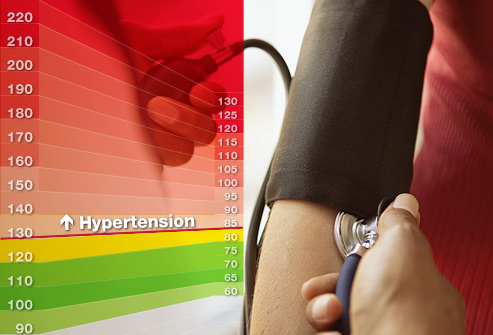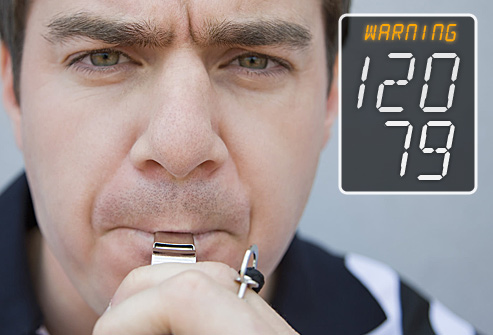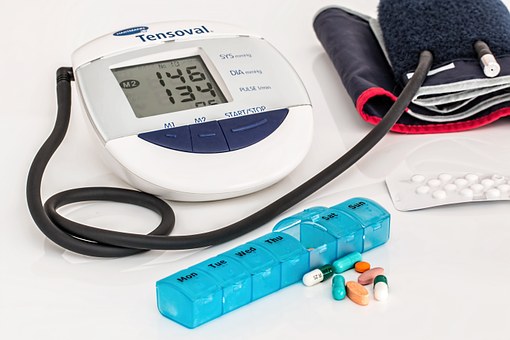
According to the World Health organisation, hypertension is responsible for an
estimated 45 percent of deaths due to heart disease and 51 percent of deaths due to
stroke globally. According to WHO’s Global status report on non communicable, of WHO’s
six regions, the African region has the highest prevalence of hypertension estimated
at 46 percent of adults aged 25 and above.
Dr.Kingsley Akinroye, a renowned cardiologist and president of Nigeria
Heart Foundation, NHF, regrets that the statistics available have shown that 70
percent of hypertensive patients go on drug holidays while the prevalence among Nigerians
is between 25 percent and 40 percent depending on the area of location.

Hypertension, also known as high or raised blood pressure,
is a condition in which the blood vessels have persistently raised pressure.
Blood is carried from the heart to all parts of the body in the vessels.
Each time the heart beats, it pumps blood into the vessels. Blood pressure is
created by the force of blood pushing against the walls of blood vessels (arteries) as
it is pumped by the heart. The higher the pressure the harder the heart has to pump.
Narrow arteries increase resistance.
The narrower your arteries are, the higher your blood pressure will be.
Over the long term, increased pressure can cause health issues, including heart disease.
Hypertension is quite common and it typically develops over the course of several years.
Usually, you don’t notice any symptoms. But even without symptoms, high blood pressure can cause
damage to your blood vessels and organs, especially the brain, heart, eyes, and kidneys.
Early detection is important. Regular blood pressure readings can help you and your doctor notice
any changes. If your blood pressure is elevated, your doctor may have you check your blood pressure
over a few weeks to see if the number stays elevated or falls back to normal levels.
Treatment for hypertension includes both prescription medication and healthy lifestyle changes.
If the condition isn’t treated, it could lead to health issues, including heart attack and stroke.
SIGNS AND SYMPTOMS
Hypertension is generally a silent condition. Many people won’t experience any symptoms. That's why it's so important to have your blood pressure checked on a regular basis (during all visits to your doctor or diabetes nurse) and to follow your doctor’s recommendations on home blood pressure monitoring. It may take years or even decades for the condition to reach levels severe enough that symptoms become obvious. Even then, these symptoms may be attributed to other issues. Symptoms of severe hypertension can include:
- headaches
- shortness of breath
- nosebleeds
- flushing
- dizziness
- chest pain
- visual changes
- blood in the urine

These symptoms require immediate medical attention. They don’t occur in everyone with hypertension,
but waiting for a symptom of this condition to appear could be fatal.
If you have a family history of heart disease or have risk factors for developing the condition,
your doctor may recommend that you have your blood pressure checked twice a year.
This helps you and your doctor stay on top of any possible issues before they become problematic
When is it high blood pressure?
If you have high blood pressure, it means that your blood is pumping through your heart and blood vessels with too much force.
Over time, consistently high blood pressure tires the heart muscle and can enlarge.
In the general population and in people with diabetes, a blood pressure reading of less
than 120/80 mm Hg is considered normal.
What does this mean? The first number (120) is called the systolic pressure. It indicates
the highest pressure exerted as blood pushes through your heart. The second number (80) is
called the diastolic pressure. This is the pressure maintained by the arteries when the vessels
are relaxed between heartbeats.
High blood pressure during pregnancy
An older study from 2003 has shown that women who have gestational diabetes are more likely
to have high blood pressure. However, women who manage their
blood sugar levels during pregnancy are less likely to experience high blood pressure.
If you develop high blood pressure during pregnancy, your doctor will monitor your urine protein levels. High urine protein levels may be a sign of preeclampsia. This is a type of high blood pressure that occurs during pregnancy.
Other markers in the blood may also lead to a diagnosis. These markers include:
- abnormal liver enzymes
- abnormal kidney function
- low platelet count
Women with hypertension can deliver healthy babies despite having the condition. But it can be dangerous to both mother and baby if it’s not monitored closely and managed during the pregnancy.
Women with high blood pressure are more likely to develop complications. For example, pregnant women with hypertension may experience decreased kidney function. Babies born to mothers with hypertension may have a low birth weight or be born prematurely.
Women with high blood pressure are more likely to develop complications. For example, pregnant women with hypertension may experience decreased kidney function. Babies born to mothers with hypertension may have a low birth weight or be born prematurely.
Some women may develop hypertension during their pregnancies. Several types of high blood pressure problems can develop. The condition often reverses itself once the baby is born. Developing hypertension during pregnancy may increase your risk for developing hypertension later in life.
Preeclampsia
In some cases, pregnant women with hypertension may develop preeclampsia during their pregnancy. This condition of increased blood pressure can cause kidney and other organ complications. This can result in high protein levels in the urine, problems with liver function, fluid in the lungs, or visual problems. As this condition worsens, the risks increase for the mother and baby. Preeclampsia can lead to eclampsia, which causes seizures. High blood pressure problems in pregnancy remain an important cause of maternal death in the United States. Complications for the baby include low birth weight, early birth, and stillbirth. There is no known way to prevent preeclampsia, and the only way to treat the condition is to deliver the baby. If you develop this condition during your pregnancy, your doctor will closely monitor you for complications.COMPLICATIONS OF HYPERTENSION
What are the effects of high blood pressure on the body?
Because hypertension is often a silent condition, it can cause damage to your body for years before symptoms become obvious. If hypertension isn’t treated, you may face serious, even fatal, complications.

Complications of hypertension include the following:
Damaged arteries
Healthy arteries are flexible and strong. Blood flows freely and unobstructed through healthy arteries and vessels.
Hypertension makes arteries tougher, tighter, and less elastic. This damage makes it easier for
dietary fats to
deposit in your arteries and restrict blood flow. This damage can lead to increased blood pressure,
blockages, and, eventually, heart attack and stroke.
Damaged heart
Hypertension makes your heart work too hard. The increased pressure in your blood vessels forces your heart’s muscles to pump more frequently and with more force than a healthy heart should have to.This may cause an enlarged heart. An enlarged heart increases your risk for the following:
- heart failure
- arrhythmias
- sudden cardiac death
- heart attack
Damaged brain
Your brain relies on a healthy supply of oxygen-rich blood to work properly. High blood pressure can reduce your brain’s supply of blood:- Temporary blockages of blood flow to the brain are called transient ischemic attacks (TIAs).
- Significant blockages of blood flow cause brain cells to die. This is known as a stroke.
TIPS FOR PREVENTION
If you have risk factors for hypertension, you can take steps now to lower your risk for the condition and its complications.
Add healthy foods to your diet
Slowly work your way up to eating more servings of heart-healthy plants. Aim to eat more than seven servings of fruits and vegetables each day. Then aim to add one more serving per day for two weeks. After those two weeks, aim to add one more serving. The goal is to have ten servings of fruits and vegetables per day.

Adjust how you think of the average dinner plate
Instead of having meat and three sides, create a dish that uses meat as a condiment. In other words, instead of eating a steak with a side salad, eat a bigger salad and top it with a smaller portion of steak.
Cut sugar
Try to incorporate fewer sugar-sweetened foods, including flavored yogurts, cereals, and sodas. Packaged foods hide unnecessary sugar, so be sure to read labels.
Set weight loss goals
Instead of an arbitrary goal to “lose weight,” talk with your doctor about a healthy weight for you. Then decide on what physical activity you can start in order to reach that goal. If exercising five nights a week is too hard to work into your schedule, aim for one more night than what you’re doing right now. When that fits comfortably into your schedule, add another night.
Monitor your blood pressure regularly
The best way to prevent complications and avoid problems is to catch hypertension early. You can come into your doctor’s office for a blood pressure reading, or your doctor may ask you to purchase a blood pressure cuff and take readings at home. Keep a log of your blood pressure readings and take it to your regular doctor appointments. This can help your doctor see any possible problems before the condition advances.
TREATMENT AND MEDICATION
How is high blood pressure treated?
ACE (angiotensin converting enzyme) inhibitors are a group of drugs that are often used to treat high blood pressure in people with diabetes. Although other high blood pressure medications are available, ACE inhibitors have been shown to not only to be a useful drug to treat high blood pressure, but have been shown to prevent or delay the progression of kidney disease in people with diabetes. Other medications used to treat high blood pressure in people with diabetes include a class of drugs called diuretics (‘water pills’). Because adequate control of blood pressure usually requires more than one medication, most doctors use ACE inhibitors first then add other anti-hypertension drugs if necessary.

Home remedies for blood pressure
Healthy lifestyle changes can help you control the factors that cause hypertension.
Here are some of the most common home remedies:
Developing a healthy diet
A heart-healthy diet is vital for helping to reduce high blood pressure. It’s also important for managing hypertension that is under control and reducing the risk of complications. These complications include heart disease, stroke, and heart attack.A heart-healthy diet emphasizes foods that include:
- fruits
- vegetables
- whole grains
Increasing physical activity
Reaching a healthy weight should include being more physically active. In addition to helping you shed pounds, exercise can help reduce stress, lower blood pressure naturally, and strengthen your cardiovascular system.Aim to get 150 minutes of moderate physical activity each week. That’s about 30 minutes five times per week.
Reaching a healthy weight
If you are overweight or obese, losing weight through a heart-healthy diet and increased physical activity can help lower your blood pressure.Managing stress
Exercise is a great way to manage stress. Other activities can also be helpful. These include:- meditation
- deep breathing
- massage
- muscle relaxation
- yoga or tai chi
Adopting a cleaner lifestyle
If you’re a smoker, try to quit.
The chemicals in tobacco smoke damage the body’s tissues and harden blood vessel walls.
If you regularly consume too much alcohol or have an alcohol dependency,
seek help to reduce the amount you drink or stop altogether.
Alcohol can raise blood pressure.
If you have diabetes, your doctor may check your blood pressure at least four times each year.
If you have diabetes and high blood pressure, it is recommended that you self-monitor at home, record the readings,
and share them with your doctor or visit the nearest clinic for checkup.
